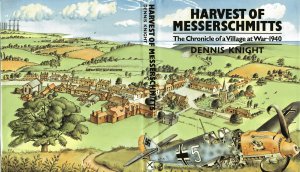
Elham Valley During War Time
Peter Verney Remembers Elham during the Battle of Britain and WW2
Elham War Memorial information

Harvest of Messerschmitts by Dennis Knight, is a chronicle of the village of Elham during 1940. It is based on the diary of Mary Smith, who lived in King Post, Elham.
Below is an extract from the book.
29th.August 1940 ..........At about the same time, 501 Squadron. were either attacked in the rear or hit by AA shells over Elham and two planes were shot down before the squadron scattered...... Bill Green was in one of the Hurricanes that went down. He recalled later. " Without warning a hole appeared in the 1/4" plate windscreen as big as a tennis ball and the noise of the splinters shattering around the cockpit will always remain with me. I was immediately covered with glycol liquid and the control column was just like a piece of stick disconnected to anything and quite useless. The engine stopped and I realised that I had to get out".
Sliding back the hood and pulling the pin from his Sutton harness, Green stood up and found himself free from the aircraft and rotating forward with his legs apart. Both flying boots came off and a considerable time passed as he fumbled for his rip-cord. When he pulled it he saw the little pilot chute deploy and detach itself from the main chute, which started to come between his legs - still folded like a roller - towel........ He pushed and tugged, resorted to prayer and thought about his wife Bertha, with whom he'd spent the previous night - she had knitted the warm socks he was wearing. As he realised he was only seconds away from oblivion, there was a jolt and a secondary tug as the parachute lines ripped from the tangled pack and he floated free. After the terror of the fall with rushing air and flapping silk the silence was "noisier than any noise I have ever heard". He saw electricity poles, relaxed and thudded down on a hill overlooking Elham................
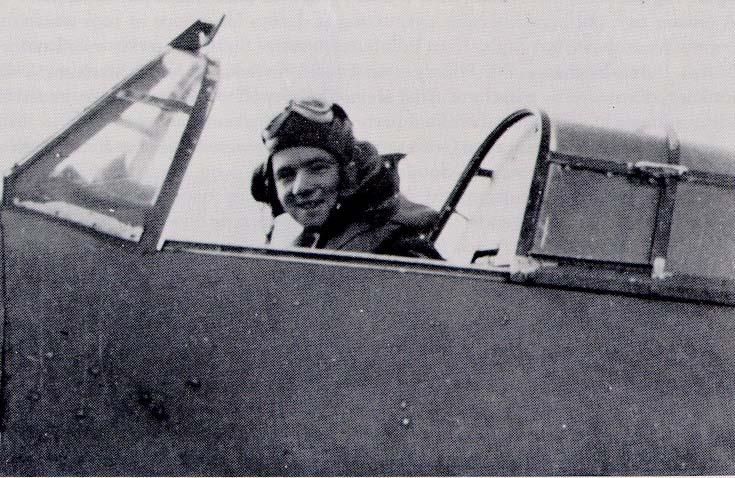
(W. Green)
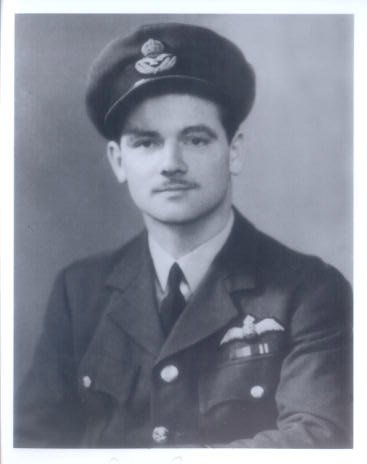
In 1995 Bill contacted Max Laker in Elham as he was trying to get a copy of the book, which is now out of print. An appeal went out in the local news sheet " In and Around Elham" and a copy of the book was soon found for this remarkably lucky pilot.
Bill and Bertha Green came to Elham on 22nd September 1995 and were presented with the book and they visited Mill Hill Farm where he landed .
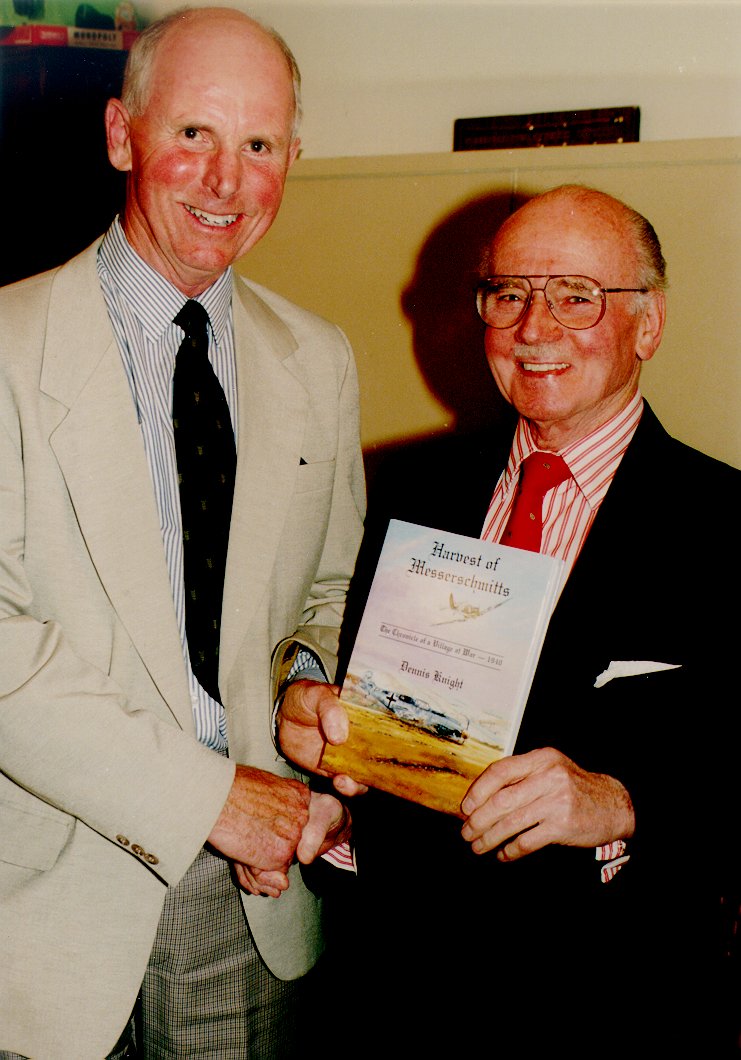
John Palmer presenting the book to Bill Green, Elham 1995.
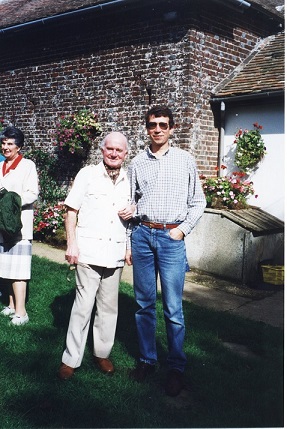
Bertha, Bill Green and Bryan Badham, Mill Hill Farm, Elham 23rd September 1995.
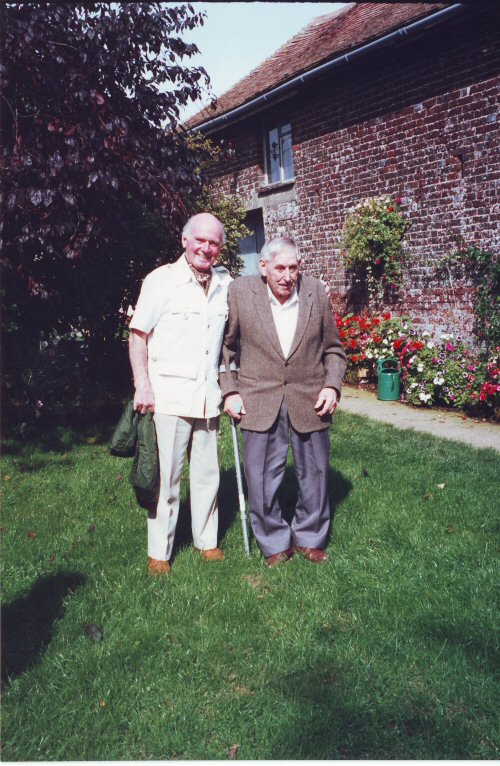
Bill Green and Mr. Goldup who saw Bill come down at the farm.
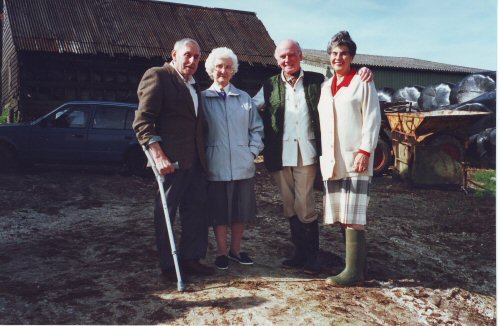
Mr. & Mrs Goldup and Bill & Bertha Green
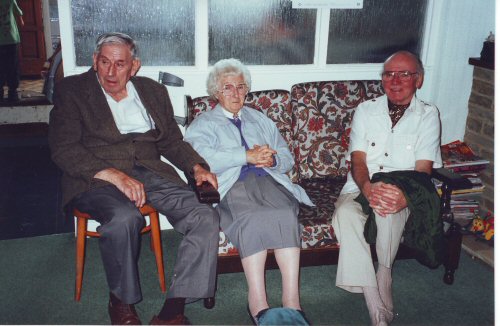
Bill sitting in the same spot he sat in 1940.
After leaving the farm Bill and Bertha went to the Battle of Britain Museum at Hawkinge where the curator immediately recognise Bill and showed him around the museum and some of the remains of his aircraft. He was also able to update Bill about the details of the crash site for his plane at Ladwood.
Bill has contributed an article to the BBC's People's War website.
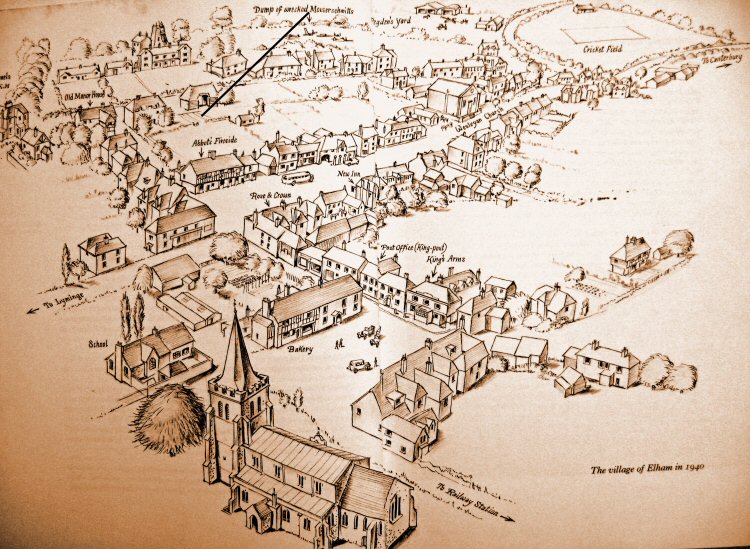
Dennis Knight's Drawing of Elham in 1940
Messerschmitt Dump In Elham
Elham Parish Local Defence Volunteers (LDV) / Home Guard
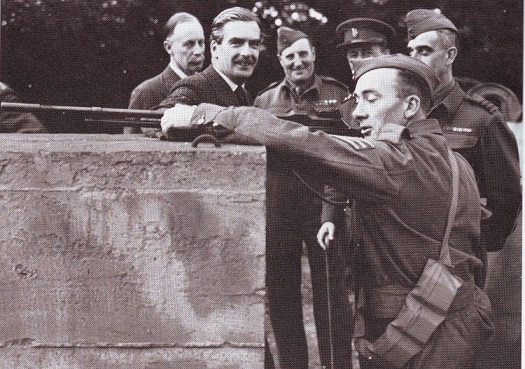
Anthony Eden Inspects a Home Guard Unit
The following is an extract from Harvest of Messerschmitts
16th May (1940)
At dawn Lord Gort, commanding the BEF, learnt of the French withdrawal plan by
accident. At 10 a.m., the stunned Belgians heard the news. As night fell, the
Allies fell back in three stages and, to complicate matters, the French 7th Army
on the left of the British and nearest the coast, was ordered to move south
across the line of withdrawal of the British and Belgian forces. This caused
such appalling confusion that various formations broke up and became lost. In
the chaos that followed a German patrol actually captured General Giraud,
Commander of the French 7th Army. To the south Guderian's tanks thrust deep into
unprotected countryside. Everywhere enormous numbers of bewildered and
demoralized French troops were beginning to give themselves up.
During the day, Anthony Eden broadcast
to the men of Britain asking for volunteers to come forward to form the Local
Defence Volunteers. After tea farmer Herbie Palmer drove his little Austin Seven
down to Elham so as to volunteer for the emergency defence force. His brother
Frank was in the ARP and brother Wallace was a special constable, and Herbie
felt he must do something because the news over the radio was appalling.
About 20 local men turned up at the inaugural gathering, all curious to know what LVD's were supposed to do. They congregated in what was an empty shop, two doors from the old post office; a policeman and some Army officials were there to record names. They were told to form themselves into a platoon and arm themselves at once to defend the Parish of Elham from invading Germans. Herbie looked around and saw his shepherd George Austin. He would be useful as he'd been a regular in the Buffs. There was the huntsman 'Foxy' Sturmy, capable, reliable and an ex-sergeant in the First World War. There was Jessup, Thorpe, George Hogben, Goodearl, Harris, Swaffer, Fletcher, Boughton, and three formidable gentlemen from the parish, Messrs. Dykes, Constant and Parker.
Kingslet Dykes, OBE, MC, who lived at Ottinge Court, was a tall, well educated gentleman farmer who had been a major in the First World War. He had gone to Russia after the war to assist the White Russians fight the Bolsheviks and his brother was a General Staff officer. So it was a natural choice for him to be their Commander. However there was George Henry Parker, the wealthy Peckham building contractor; he couldd virtually provide a platoon from his employees. Also there was their close friend Martin Constant, the incumbent of Lower Court. In fact they had too many chiefs.
The matter was resolved for the time being. Major Kingsley Dykes would be Platoon Commander, George Henry Parker second-in-command, and 'Foxy' Sturmy would be the sergeant. Mr Constant would be another sergeant of what they'd call the `Ottinge Section', the men being drawn mostly from his own staff at Lower Court. The three gentlemen were drinking chums at the Rose & Crown and they could sort out the finer points about rank at a later date.
Kingsley
Dykes addressed his band of men, calling them 'gentlemen'. With his slight
stutter, he thought it best to try and reassure them that the news from France
might not be as bad as it seemed. They were asked to be in Elham Square the
following night, armed with whatever weapons they could lay their hands on. When
the meeting broke up, some went into the King's Arms, whilst others popped into
the Rose & Crown or the New Inn, thereby presaging a custom that was to become
well established.
17th May. Brussels captured.
Herbie Palmer found himself standing in a line of men in Elham Square that evening wearing a trilby hat and trying to do some arms drill with his 12-bore shot-gun. In the pockets of his jacket he had about eight cartridges. Most of the men had shot-guns which ranged from trusty old hammer-guns to finely engraved sporting pieces, but there were some little .22 rifles. An army drill instructor was there and it was all rather embarrassing. Palmer's shepherd, who had been in the Buffs, seemed to know so much more about soldiering than the farmer. Quite a number of villagers gathered to watch and were greatly amused when, trying to slope-arms, the farmer clouted his head with his gun, knocking off his hat. Many of the new platoon popped into their pub before going home and it was arranged to have another muster on Sunday morning.
3oth June
Sunday. The Local Defence Volunteers were growing in strength (Reverend Williams had joined their ranks), but the combined fire power of the Elham Platoon would hardly have stopped a charging bull. They had been given fawn armbands with the initials LDV printed in black and were meeting one or two nights a week and on Sunday mornings, when a Regular Army sergeant major came to drill and instruct them. It seemed that field-craft and actually shooting at Germans was of less importance than stamping feet and getting into straight lines. However, it was going to be difficult when harvesting started because most of the men worked on the land and when you started harvesting, you didn't stop.
Last updated 19/02/2014